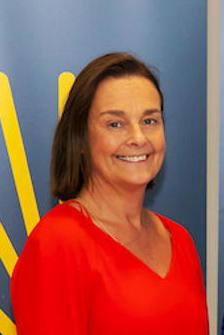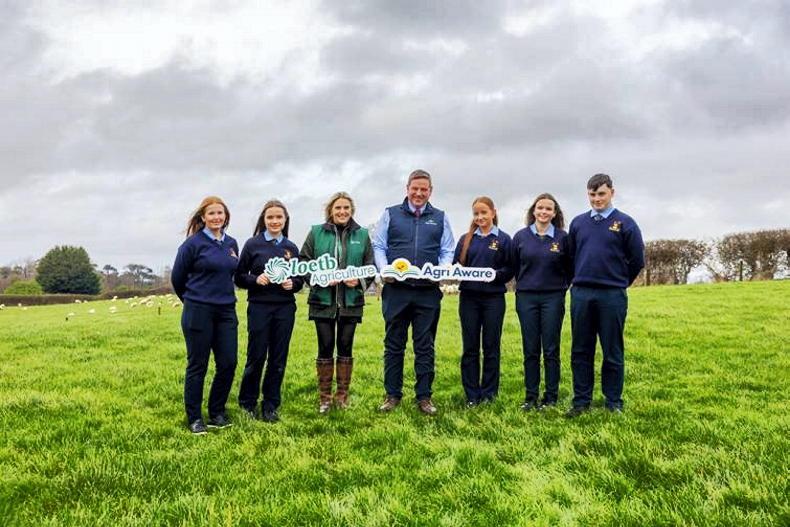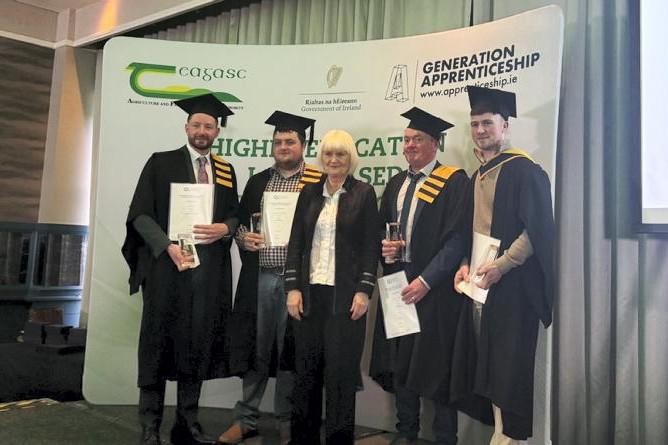The Central Applications Office (CAO) recently released data about the most popular courses for students applying to go to college this year, and the news is not good for the farming sector.
The figures reveal a significant fall of 19% in first preferences for Level 8 degree courses related to agriculture.
Last year, 485 students put agriculture down as their first choice, compared to 393 this year. In addition, the figures represent a further 19% decline for Level 6/7 agriculture courses.
The total mentions of agriculture courses on students’ CAO applications were also down by 12%. In 2023, 2,405 students had a Level 8 agriculture course listed throughout their application, compared to 2,106 this year.
The dip in interest will likely result in a large drop in the points required to study agriculture science at third level, and will be welcome news for Leaving Certificate students waiting for their results and course offers.
Students’ interest in veterinary remains strong, with 908 first preferences for Level 8 courses, compared to 876 in 2023, representing a 4% increase. Level 7/6 courses have seen a 1% increase in the number of students putting it down as their first choice.
With roughly 85 places available in University College Dublin (UCD), demand is far exceeding supply. There has been no further announcement about additional places for this year, with four colleges still shortlisted for the new vet school. Despite many calls for clarity, it’s unclear when a decision on the location will be made.
Teachers’ survey
In February, Irish Country Living had a three-week series on the drop in the number of students doing agriculture science as a Leaving Cert subject.
At the time, 76% of teachers who took part in a survey conducted by Irish Country Living noted this decline correlated with the new syllabus being introduced in 2019.
Serious concerns were raised by the Irish Agriculture Science Teachers’ Association (IASTA) in April 2023, who wrote a letter to the Minister of Education, Norma Foley.
Joe Corroon, IASTA chairman told Irish Country Living the decline in students interested in third-level courses is a direct result of the drop at second level. Students are less likely to get a H1 in the subject, which has resulted in lower numbers.
“It’s not surprising, in a way, because there is a drop at secondary school,” says Joe. “Students are unlikely to take the subject up out of the blue for third-level if they haven’t studied it for the Leaving Certificate.
There are already two more years of students that have picked their subjects – one going into fifth year and one going into sixth year, he says, and anecdotally, the decline is continuing.Even if the numbers changed today, there would still be two more years of slippage before we would see an increase at third-level, Joe explains.
“The big pity is that all the colleges and Teagasc colleges have invested hugely in their ag courses and the development of their programmes,” he adds.
Most students who are interested in the subject and who are from an agricultural background are still doing the subject.
“What we are missing, certainly in my school, is the students who would pick it up from other backgrounds,” says Joe. “They would often be looking at it because they think they can get high points in it. That’s gone now.”
“They’re not going to pick ag science because they won’t score high with the low level of H1s,” he says.
Frank Monahan, Dean of Agriculture at University College Dublin

Professor Frank Monahan
The School of Agriculture and Food Science at UCD saw a decrease of 9.7% in first preferences for agricultural science this year. However, the total applications for degree programmes in the school increased by 1.4%. So there remains a strong demand for the programmes, which is positive.
According to Frank, there are several reasons for the decline in first preferences. Among them is competition for careers in other sectors of the economy.
“We need to be better at promoting the excellent career opportunities open to graduates within the agri-food sector. The decrease in first preferences may also reflect a decrease in the number of students taking Leaving Certificate agricultural science. At UCD, two-thirds of students studying agricultural science have taken Leaving Certificate agricultural science,” says Frank.
In this context, together with IASTA, Frank has recently written to the Minister for Education, Norma Foley, concerning the challenges agricultural science teachers have with the current Leaving Certificate agricultural science curriculum.
“This may be impacting the capacity of schools to offer Leaving Certificate agricultural science,” he says.
Eleanor Kent, head of the Department of Land Sciences in South East Technological University (SETU)

Dr. Eleanor Kent.
“SETU’s agriculture course applications have remained stable despite the national trends, with a very small 3% reduction in our first preferences,” says Eleanor. “The CAO experiences swings in the application numbers from year to year but universities such as SETU with a very strong heritage and hinterland tend to remain stable in terms of its first preferences for land sciences related programmes.”
Anne-Marie Butler, head of education in Teagasc

ASA President Anne Marie Butler.
“The growth in overall third-level courses across all disciplines is welcomed and offers learners tremendous variety and choice. Agriculture, however, must compete to attract learners and, as an industry, we need collective approaches to entice learners and demonstrate the extensive options available with an agricultural qualification from Level 5 to Level 10 (PhD).”
Mark Kelleher, interim CEO National Dairy Council

Mark Keller.
“The industry receives and requires significant investment to ensure that innovation in sustainable food production and product development continutes to protect and grow Ireland’s internationally renowned reputation. As an industry, agriculture in general is rarely spoken about from a career perspective and while all involved in agriculture accept their responsibilities in transitioning towards a sustainable food production system, it is difficult to find a positive narrative about the benefits and )fulfilling experiences a career in agriculture can provide.”
Shay Monaghan, Biology and Agricultural Science teacher Ursuline College Sligo
“The students from a non-farming background aren’t aware of the opportunities to study ag at third level as they don’t get a chance to experience agriculture in the classroom,” says Shay. “Students are picking other subjects to improve the chances of getting good points in their Leaving Cert. We need bright young people studying agricultural as we need more food produce in a more sustainable farming system.”
Read more
Agri Careers: Increasing accessibility to adult education
‘The UK's approach to dairy systems has more emphasis on indoor systems’
The Central Applications Office (CAO) recently released data about the most popular courses for students applying to go to college this year, and the news is not good for the farming sector.
The figures reveal a significant fall of 19% in first preferences for Level 8 degree courses related to agriculture.
Last year, 485 students put agriculture down as their first choice, compared to 393 this year. In addition, the figures represent a further 19% decline for Level 6/7 agriculture courses.
The total mentions of agriculture courses on students’ CAO applications were also down by 12%. In 2023, 2,405 students had a Level 8 agriculture course listed throughout their application, compared to 2,106 this year.
The dip in interest will likely result in a large drop in the points required to study agriculture science at third level, and will be welcome news for Leaving Certificate students waiting for their results and course offers.
Students’ interest in veterinary remains strong, with 908 first preferences for Level 8 courses, compared to 876 in 2023, representing a 4% increase. Level 7/6 courses have seen a 1% increase in the number of students putting it down as their first choice.
With roughly 85 places available in University College Dublin (UCD), demand is far exceeding supply. There has been no further announcement about additional places for this year, with four colleges still shortlisted for the new vet school. Despite many calls for clarity, it’s unclear when a decision on the location will be made.
Teachers’ survey
In February, Irish Country Living had a three-week series on the drop in the number of students doing agriculture science as a Leaving Cert subject.
At the time, 76% of teachers who took part in a survey conducted by Irish Country Living noted this decline correlated with the new syllabus being introduced in 2019.
Serious concerns were raised by the Irish Agriculture Science Teachers’ Association (IASTA) in April 2023, who wrote a letter to the Minister of Education, Norma Foley.
Joe Corroon, IASTA chairman told Irish Country Living the decline in students interested in third-level courses is a direct result of the drop at second level. Students are less likely to get a H1 in the subject, which has resulted in lower numbers.
“It’s not surprising, in a way, because there is a drop at secondary school,” says Joe. “Students are unlikely to take the subject up out of the blue for third-level if they haven’t studied it for the Leaving Certificate.
There are already two more years of students that have picked their subjects – one going into fifth year and one going into sixth year, he says, and anecdotally, the decline is continuing.Even if the numbers changed today, there would still be two more years of slippage before we would see an increase at third-level, Joe explains.
“The big pity is that all the colleges and Teagasc colleges have invested hugely in their ag courses and the development of their programmes,” he adds.
Most students who are interested in the subject and who are from an agricultural background are still doing the subject.
“What we are missing, certainly in my school, is the students who would pick it up from other backgrounds,” says Joe. “They would often be looking at it because they think they can get high points in it. That’s gone now.”
“They’re not going to pick ag science because they won’t score high with the low level of H1s,” he says.
Frank Monahan, Dean of Agriculture at University College Dublin

Professor Frank Monahan
The School of Agriculture and Food Science at UCD saw a decrease of 9.7% in first preferences for agricultural science this year. However, the total applications for degree programmes in the school increased by 1.4%. So there remains a strong demand for the programmes, which is positive.
According to Frank, there are several reasons for the decline in first preferences. Among them is competition for careers in other sectors of the economy.
“We need to be better at promoting the excellent career opportunities open to graduates within the agri-food sector. The decrease in first preferences may also reflect a decrease in the number of students taking Leaving Certificate agricultural science. At UCD, two-thirds of students studying agricultural science have taken Leaving Certificate agricultural science,” says Frank.
In this context, together with IASTA, Frank has recently written to the Minister for Education, Norma Foley, concerning the challenges agricultural science teachers have with the current Leaving Certificate agricultural science curriculum.
“This may be impacting the capacity of schools to offer Leaving Certificate agricultural science,” he says.
Eleanor Kent, head of the Department of Land Sciences in South East Technological University (SETU)

Dr. Eleanor Kent.
“SETU’s agriculture course applications have remained stable despite the national trends, with a very small 3% reduction in our first preferences,” says Eleanor. “The CAO experiences swings in the application numbers from year to year but universities such as SETU with a very strong heritage and hinterland tend to remain stable in terms of its first preferences for land sciences related programmes.”
Anne-Marie Butler, head of education in Teagasc

ASA President Anne Marie Butler.
“The growth in overall third-level courses across all disciplines is welcomed and offers learners tremendous variety and choice. Agriculture, however, must compete to attract learners and, as an industry, we need collective approaches to entice learners and demonstrate the extensive options available with an agricultural qualification from Level 5 to Level 10 (PhD).”
Mark Kelleher, interim CEO National Dairy Council

Mark Keller.
“The industry receives and requires significant investment to ensure that innovation in sustainable food production and product development continutes to protect and grow Ireland’s internationally renowned reputation. As an industry, agriculture in general is rarely spoken about from a career perspective and while all involved in agriculture accept their responsibilities in transitioning towards a sustainable food production system, it is difficult to find a positive narrative about the benefits and )fulfilling experiences a career in agriculture can provide.”
Shay Monaghan, Biology and Agricultural Science teacher Ursuline College Sligo
“The students from a non-farming background aren’t aware of the opportunities to study ag at third level as they don’t get a chance to experience agriculture in the classroom,” says Shay. “Students are picking other subjects to improve the chances of getting good points in their Leaving Cert. We need bright young people studying agricultural as we need more food produce in a more sustainable farming system.”
Read more
Agri Careers: Increasing accessibility to adult education
‘The UK's approach to dairy systems has more emphasis on indoor systems’












SHARING OPTIONS